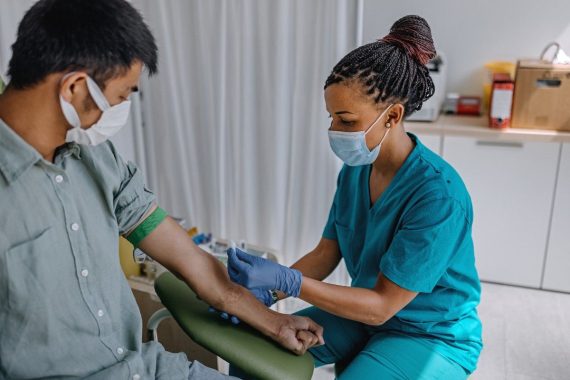GP practices training receptionists to do blood tests

Exclusive A number of London GP practices are training their receptionists to do blood tests, Pulse has learned.
Professor Sir Sam Everington, a GP and chair of Tower Hamlets CCG, told Pulse that ‘lots of practices’ in the area have taken the step, including his own.
Training a receptionist to carry out blood tests – which can be done in just six weeks – provides much-needed support to pressured practices, he said.
Dr Everington told Pulse: ‘A lot of our receptionists have signed up to be phlebotomists and they love it because actually, phlebotomy is not just about taking blood.
‘You get to know all the patients with long-term conditions and so our phlebotomists know all these patients – they’re friends.’
He added that reception teams are a ‘fertile recruitment ground’ for a phlebotomist. They can ‘manage even the most terrified patients’ and have ‘amazing’ clinical skills.
He said: ‘One of my phlebotomists rang through to me one day and said, “this patient was just a bit off-colour today. I know them well so I asked them a few questions then I tested their urine and they had a bit of pain with that”.
‘And she said to me – this is somebody with no nursing or medical training – “I think they’ve got pyelonephritis”. And she was right.’
Dr Everington suggested that training receptionists as phlebotomists can help build trust with patients who are suspicious about having to describe their symptoms for triage by reception staff.
But he said that the extra role just ‘acknowledges’ that all members of practice staff are ‘part of the clinical team’.
He told Pulse: ‘In our practice, we all train together. We have meetings together, the whole team, and it’s acknowledging in this modern world that actually every member of your staff is a clinician – part of the clinical team – because there are always things they will do or can do that will have an impact clinically.’
He added: ‘What it symbolises is the importance of the clinical team going forward. That will be the saviour of GPs from the pressure of their work – the wider team.
‘There isn’t a hidden supply of GPs out there in the next few years. It takes 10 years to train GPs so actually help is going to come from a wider team base.’
Practices in his area have taken on a contract to manage outpatient phlebotomy on behalf of the Royal London hospital, Dr Everington said.
Meanwhile, ‘at least’ 100 community diagnostic centres are planned to be in place over the next three years across England that will be open to GP referrals for blood tests and other checks and scans.
In September, the RCGP’s clinical cancer adviser suggested that receptionists should be better trained to help improve access for patients who need to see a doctor face to face and ‘develop a culture where patients are happy to discuss their symptoms with the receptionist’.
GPs faced a four-month crisis last year when there was a shortage of blood bottles from a key UK supplier of blood test tubes.
Pulse October survey
Take our July 2025 survey to potentially win £1.000 worth of tokens

Related Articles
READERS' COMMENTS [5]
Please note, only GPs are permitted to add comments to articles











Yet again. Covering up for them and the system.
we have done this for years
works very well
Nothing new or unusual – why has this made the headlines?
And ECGs, Spirometry, B12 injections under PSDs.
Taking observations for urgent presentations before seen by Dr/NP
Dental receptionists now doing scaling – sounds weird. Not in a GPs altruistic hands it doesn’t.